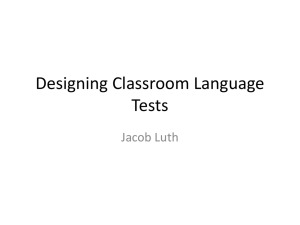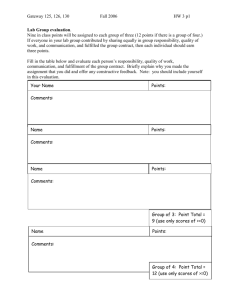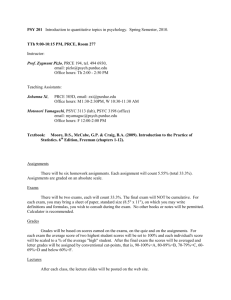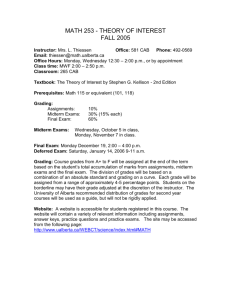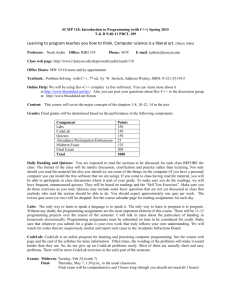CS 107, Introduction to Computing and Programming Course Policies
advertisement
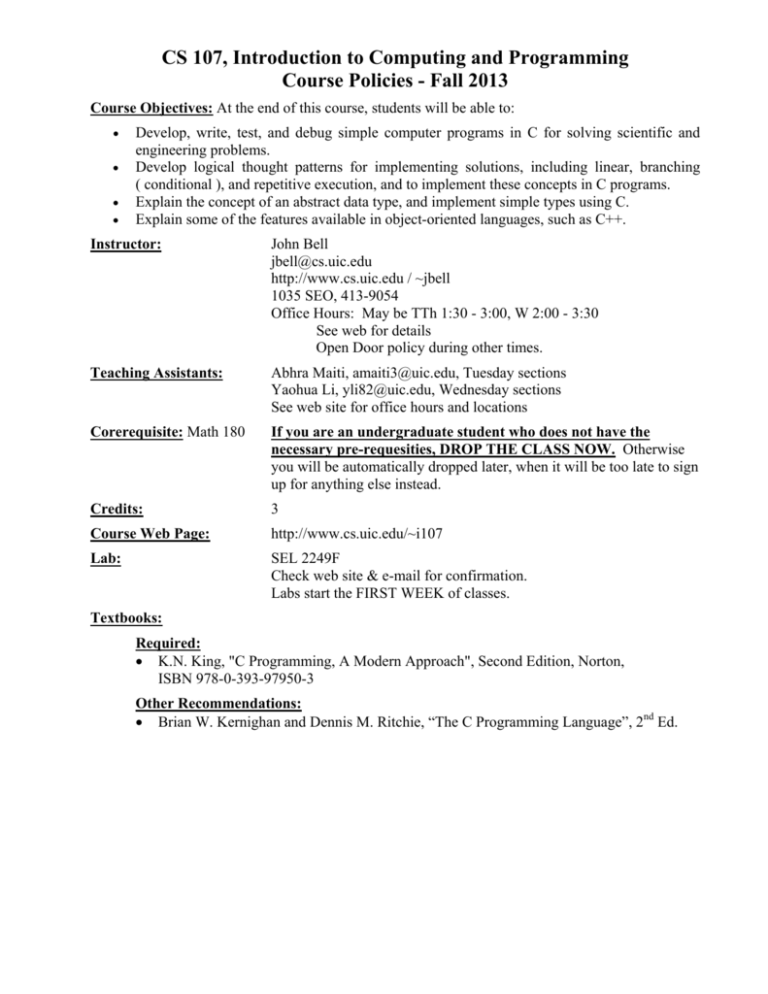
CS 107, Introduction to Computing and Programming Course Policies - Fall 2013 Course Objectives: At the end of this course, students will be able to: Develop, write, test, and debug simple computer programs in C for solving scientific and engineering problems. Develop logical thought patterns for implementing solutions, including linear, branching ( conditional ), and repetitive execution, and to implement these concepts in C programs. Explain the concept of an abstract data type, and implement simple types using C. Explain some of the features available in object-oriented languages, such as C++. Instructor: John Bell jbell@cs.uic.edu http://www.cs.uic.edu / ~jbell 1035 SEO, 413-9054 Office Hours: May be TTh 1:30 - 3:00, W 2:00 - 3:30 See web for details Open Door policy during other times. Teaching Assistants: Abhra Maiti, amaiti3@uic.edu, Tuesday sections Yaohua Li, yli82@uic.edu, Wednesday sections See web site for office hours and locations Corerequisite: Math 180 If you are an undergraduate student who does not have the necessary pre-requesities, DROP THE CLASS NOW. Otherwise you will be automatically dropped later, when it will be too late to sign up for anything else instead. Credits: 3 Course Web Page: http://www.cs.uic.edu/~i107 Lab: SEL 2249F Check web site & e-mail for confirmation. Labs start the FIRST WEEK of classes. Textbooks: Required: K.N. King, "C Programming, A Modern Approach", Second Edition, Norton, ISBN 978-0-393-97950-3 Other Recommendations: Brian W. Kernighan and Dennis M. Ritchie, “The C Programming Language”, 2nd Ed. CodeLab: During this term, we will be using an automated on-line exercise program called CodeLab, which will give you immediate feedback on your work and show a variety of different acceptable solutions to any problem in addition to other features and benefits. REGISTRATION: 1. Go to www.tcgo1.com --OR-- www.tcgo2.com 2. Click "Register for CodeLab" 3. choose "I am a student in a course ..." and click CONTINUE 4. enter the Section Access Code: ILLI-11907-WWWX-18 and click CONTINUE 5. continue filling out the forms being careful to enter a VALID email address and first and last names (these will appear in the professor's roster) LOGIN: 1. Go to www.tcgo1.com --OR-- www.tcgo2.com 2. Click "Login to CodeLab" 3. the username and password are the email and password given during registration. 4. A $25 fee is required to get full access to CodeLab. ( Go to the “Lobby” link. ) Academic Integrity: Students are encouraged to study together and to help each other learn. When one student teaches another, both benefit from the experience. However, it is a strict violation of class and university policy for any student to hand in any work that is not 100% their own creation. Therefore: All work on all exams and all homeworks must be individually performed by the student whose name appears on the paper. No student may give any other student any portion of their code, either written down, electronically, or through any other means. Students are responsible for safeguarding the integrity of their work. This includes but is not limited to changing their passwords and keeping their computer accounts secure. Direct copying of code from any textbook or other source is strictly forbidden. Students may discuss homework problems, including background concepts and general solution strategies, but they are forbidden from discussing or sharing specific solutions. In particular, it is forbidden for any student to show any other student any portion of their computer programs or homework solutions for any reason, including debugging assistance. This means you must hand in your own homework. You are not allowed to see anyone else's work, or show your work to anyone. Failure to protect the privacy of your work is also a violation. All submitted programs will be analyzed using MOSS, to identify any unacceptable similarity to other students’ code or to previous or published solutions if applicable. In the case of extreme discrepancy between homework performance and exam performance ( e.g. very high homework scores and very low exam scores ), the instructor shall determine which scores more accurately reflect the students' true work. First violations will be immediately assigned a NEGATIVE score, for all parties involved in the transgression, and may also be penalized with a grade reduction and/or failure. Second or more serious violations will be reported directly to the Vice Chancellor for Student Affairs, and may result in a failing grade, probation, suspension, or expulsion from the university, as well as being documented on the permanent records of all students involved. Planned Schedule: The following schedule is planned, as of August 2013, and is subject to dynamic adjustment as necessary. ( A more detailed schedule may appear on the class web site. ) Weeks 1 2 3 4 5 6 7 Introduction & Fundamentals Data types, basic input & output Library functions, Expressions Selection ( Decision Logic ) Loops Arrays Writing Functions Chapters & Sections 1, 2, App B, C 7, App E, 3 21, App D, 4 5 6 8 9 8 9 10 11 Organization ( scope ), Declarations Pointers, Pointers & Arrays Strings File and binary I/O 10, 18 11, 12 13 22 Structs, unions, enums ( struct pointers ) Advanced pointers, Design, ADT Preprocessor, large programs What is OO Programming / C++ ? All of the Above 16 17 14, 15 12 13 14 15 Finals Topic All of the Above Notes No Class Monday HW 1 Due HW 2 Due HW 3 Due Codelab due Tues 8 a.m. Midterm I on weeks 1-5 6-8 P.M. Thurs 10 Oct HW 4 Due HW 5 Due Codelab due Tues 8 a.m. Midterm II on weeks 1-10 6-8 P.M. Thurs 7 Nov HW 6 Due No Class Friday HW 7 Due Codelab due Sun 8 a.m. Final Exam TUESDAY 10 DEC 3:30 - 5:30 P.M. MIDTERM EXAM I, THURSDAY 10 OCTOBER, 6:00 – 8:00 P.M. MIDTERM EXAM II, THURSDAY 7 NOVEMBER, 6:00 – 8:00 P.M. FINAL EXAM TUESDAY 10 DEC 3:30 - 5:30 P.M. Course listed FIRST in online timetable has precedence in case of conflicts. HW due 8:00 a.m. on Mondays. Solutions presented in lab starting 8:00 Tuesday. Mandatory Laboratory Attendance: Attendance at all laboratory sessions after the initial add/drop period is required. If you are an advanced student who feels you have nothing to learn from the labs, then you can spend the lab period exploring advanced concepts or else helping your fellow students - You will find that you never truly understand something until you have to explain it to someone else. Laboratory Scores TAs will assign a "laboratory score" to each student at the end of the semester. In addition to attendance, laboratory scores may be based on participation, effort and attitude as well as performance on lab activities. Lab scores will be independent of homework and quizzes. Grading Policy: Numerical scores will be based upon the following contributions: ( 3 ) Exams ( 2 midterm, 1 final ) Programming assignments Quizzes CodeLab assignments Lab Score Total: 20 points each 10 points each 5 points each TBD 10 points Normalized to 100 point scale Unless otherwise specified, all programming & homework assignments will carry equal weight. The exact number of such assignments will be determined as the course progresses. Conversion of numerical scores to letter grades is a serious business, requiring careful consideration of every student’s complete semester performance, and will not be considered until all scores are compiled at the end of the semester. There is no upper limit to the number of As, Bs, etc., so it is theoretically possible for everyone to get an A. However it is expected that grades will follow the general pattern given below. Regardless of the numerical score, it will not be possible to pass this course without passing the exams, particularly the final exam, and completing most of the homework assignments. The grade break for: A/B B/C C/? will probably be somewhere around: 90 80 70 Note that the final grade breaks may be either slightly below or slightly above the numbers given here. Homework Grading Policies Specific homework grading guidelines will be determined on a case-by-case basis. programming assignments, it is expected that the points will break down roughly as follows: Program compiles and runs ( using Dev C++ on ACCC computers ) Program handles simple, straightforward situations: Program handles more advanced and/or tricky situations: Program is efficiently written using good programming style: For 25% 25% 25% 25% Notes: 1. The first 50% of any assignment should be relatively easy to get. Anyone who hands in a program that compiles, is documented, and shows a reasonable attempt to complete the assignment should get at least half the points. Scores less than 50% are for incomplete assignments or work that just isn't worth much at all. 2. Scores from 50 to 90 % are based on quality and performance, with most scores expected to be in the 70 to 90 range. 3. The last 10% should be hard to get. Scores over 90 should only go to notably excellent papers, with scores of 100 going only to perfect error-free work. Grading Pools It is not possible to maintain 100% consistency between all sections of this course, because different TAs will always teach and/or grade a little bit differently. Therefore separate grading pools will be established corresponding to students taught and graded by the same TA, and each student's scores will only be compared against the other students in the same grading pool. Grading between different TAs may or may not be consistent with each other, but that is unimportant, as each grading pool will be evaluated independently of the others. Exam Policy: All mid-term exams will be given at night, so that students will have ample time to complete the exam. Exams will be written so that the average student will be expected to finish in about an hour, so time constraints will not be a factor. Any exam conflict needs to be brought to the instructor’s attention for resolution before the regularly scheduled exam. Requests for make-up exams after the regularly scheduled exam will not normally be granted. Exams will be closed-book. One crib sheet will be allowed, no larger than 8.5x11 inches, double sided, handwritten. All exams will be cumulative, with emphasis on material which has not been covered on previous exams. All material covered in class or in assigned reading or which should have been learned in the course of completing homework is fair game on exams. No more specific information will be provided as to exam content. Anyone who fails to stop working on their exam when time is called will receive a minimum of a 5 point late penalty. Special Considerations All programs must be turned in using Blackboard. Each program must be accompanied by a user documentation file. Programs must compile and run properly using Dev C++ on the ACCC XP Computers to receive full credit. Programs which run on other systems ( e.g. Microsoft’s Visual Studio ) but which do not run on the ACCC systems will be downgraded accordingly, at the grader’s discretion. Programs that do not compile will automatically lose 25% of the possible points. Non compiling programs may still be eligible for the other 50% of the points based on programming and the 25% based on documentation. The user documentation file is for the benefit of someone who would be using your program, but who does not get to see the code, and who has not read the assignment. Assignments submitted after the due date and time, but within 24 hours, will be assessed a 20% penalty. No assignments will be accepted more than 24 hours after the due date and time. All appeals for grading errors, no matter how justified, must be submitted within two weeks after the graded assignments are returned. No appeals for regrades will be heard after that time.
